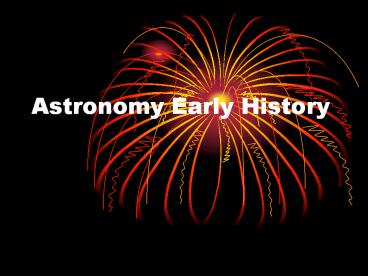Astronomy%20Early%20History - PowerPoint PPT Presentation
Title:
Astronomy%20Early%20History
Description:
Astronomy Early History What is Astronomy? Astronomy is the scientific study of celestrial objects (such as stars, planets, comets, nebulae, star clusters and ... – PowerPoint PPT presentation
Number of Views:261
Avg rating:3.0/5.0
Title: Astronomy%20Early%20History
1
Astronomy Early History
2
What is Astronomy?
- Astronomy is the scientific study of celestrial
objects (such as stars, planets, comets, nebulae,
star clusters and galaxies) and phenomena that
originate outside the Earths atmosphere. - It is concerned with the evolution, physics,
chemistry, meteorology, and motion of celestial
objects, as well as the formation and development
of the universe.
3
We are not studying Astrology!!!!
- Astrology the belief system which claims that
human affairs are correlated with the positions
of celestial objects. - We will not be reading palms, tarot cards or
checking our horoscopes in this class. So know
the difference!
4
(No Transcript)
5
(No Transcript)
6
(No Transcript)
7
Early history
- Early cultures identified celestial objects with
gods and spirits. This is where Astronomy and
Astrology share their origins. - They related these objects (and their movements)
to phenomena such as rain, drought, seasons, and
tides. - The first "professional" astronomers were priests
(such as the Magi), and that their understanding
of the heavens was directly related to the divine.
8
Mesapotamia
- Babylonian star catalogues dating from about 1200
BC. - These tablets documented
- length of daylight over a solar year,
- Constellations
- Planet movement
- Lunar cycles and more.
9
Egypt
- Culture and Religion based on the stars.
- The pyramids were based on alignment with
different stars.
10
India
- earliest to use Algebra to solve astronomical
problems. - Also developed methods for calculations of the
motions and places of various planets, their
rising and setting, and the calculation of
eclipses.
11
China
- Chinese astronomers were able to precisely
predict comets and eclipses. - First to record "guest stars" which suddenly
appeared among the fixed stars. - They were the first to record a supernova.
12
Greece
- The Ancient Greeks developed astronomy, which
they treated as a branch of mathematics, to a
highly sophisticated level. - The first geometrical, three-dimensional models
to explain the apparent motion of the planets
were developed. - First to propose that the Earth rotates around
its axis.































